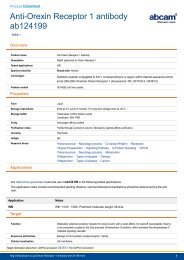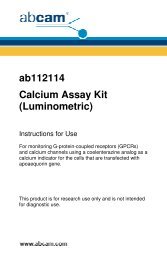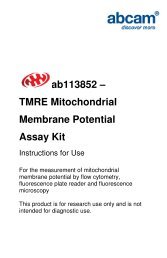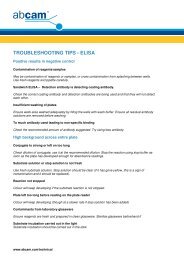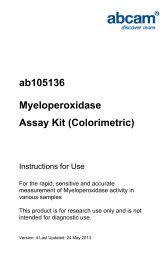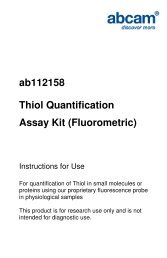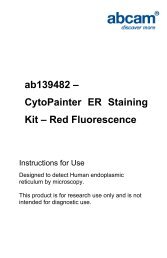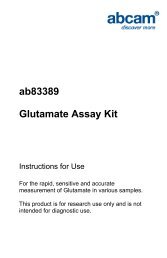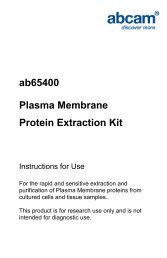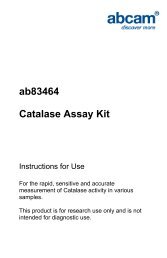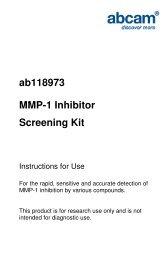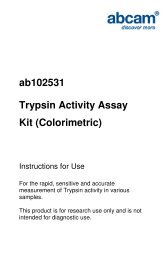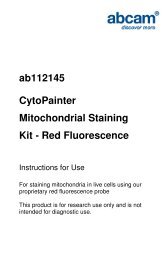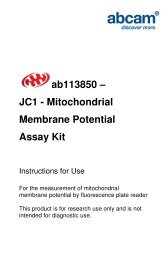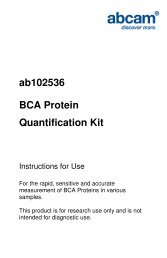Anti-Malondialdehyde antibody (ab6463) - Abcam
Anti-Malondialdehyde antibody (ab6463) - Abcam
Anti-Malondialdehyde antibody (ab6463) - Abcam
You also want an ePaper? Increase the reach of your titles
YUMPU automatically turns print PDFs into web optimized ePapers that Google loves.
Product Datasheet<br />
<strong>Anti</strong>-<strong>Malondialdehyde</strong> <strong>antibody</strong> <strong>ab6463</strong><br />
1 Abreviews 11 References 画 像 数 2<br />
Overview<br />
Product name<br />
Description<br />
Specificity<br />
Tested applications<br />
Immunogen<br />
<strong>Anti</strong>-<strong>Malondialdehyde</strong> <strong>antibody</strong><br />
Rabbit polyclonal to <strong>Malondialdehyde</strong><br />
Using conjugated <strong>Malondialdehyde</strong>-Protein, <strong>antibody</strong> specificity was performed with an ELISA test by competition<br />
experiments with the following compounds:<br />
Compound<br />
Cross-reactivity ratio(a)<br />
<strong>Malondialdehyde</strong>-BSA 1<br />
4-hydroxy-nonenal-BSA, Acroleine-BSA, Formaldehyde-BSA, Azelaic acid-BSA1/>100,000<br />
(a)<strong>Malondialdehyde</strong>-BSA concentration /unconjugated or conjugated analogs concentration at half displacement<br />
BSA = Bovine Serum Albumin<br />
WB, IHC-Fr, ELISA, IHC-P<br />
Chemical / Small Molecule: Synthetic <strong>Malondialdehyde</strong> conjugated to bovine serum albumin<br />
(BSA)(available as ab126288).<br />
Properties<br />
Form<br />
Storage instructions<br />
Purity<br />
Clonality<br />
Isotype<br />
Liquid<br />
Shipped at 4°C. Upon delivery aliquot and store at -20°C or -80°C. Avoid repeated freeze / thaw cycles.<br />
Whole antiserum<br />
Polyclonal<br />
IgG<br />
Research Areas Neuroscience Neurology process Neurodegenerative disease Alzheimer's disease<br />
Other<br />
Signal Transduction Metabolism Lipid metabolism<br />
Metabolism Pathways and Processes Metabolic signaling pathways<br />
Amino acid metabolism<br />
Metabolism Types of disease Neurodegenerative disease<br />
Metabolism Types of disease Cancer<br />
Applications<br />
Our Abpromise guarantee covers the use of <strong>ab6463</strong> in the following tested applications.<br />
The application notes include recommended starting dilutions; optimal dilutions/concentrations should be determined by the end user.<br />
Application<br />
WB<br />
Notes<br />
WB: 1/1000 - 1/2000. Recommended blocking agent is horse serum.<br />
IHC-Fr IHC-Fr: 1/1000 - 1/5000.<br />
ELISA<br />
ELISA: Use at an assay dependent dilution.<br />
IHC-P IHC-P: 1/1000 - 1/5000.<br />
Target<br />
Relevance<br />
<strong>Malondialdehyde</strong> (MDA) is a natural product formed in all mammalian cells as a product of lipid peroxidation.<br />
MDA is a highly reactive three carbon dialdehyde produced as a byproduct of polyunsaturated fatty acid<br />
peroxidation and arachidonic acid metabolism. MDA readily combines with several functional groups on<br />
molecules including proteins, lipoproteins, and DNA. It reacts with DNA to form adducts to deoxyguanosine and<br />
http://www.abcam.co.jp/<strong>Malondialdehyde</strong>-<strong>antibody</strong>-<strong>ab6463</strong>.html 1
Product Datasheet<br />
Alternative names<br />
deoxyadenosine. The major adduct to DNA is a pyrimidopurinone called M1G which appears to be a major<br />
endogenous DNA adduct in human beings that may contribute significantly to cancer linked to lifestyle and<br />
dietary factors. MDA modified proteins may show altered physico chemical behavior and antigenicity. MDA is<br />
toxic and has been implicated in aging mutagenesis, carcinogenesis, diabetic nephropathy and radiation<br />
damage. Increased expression of MDA has been reported in the brains of Alzheimer's patients. <strong>Anti</strong>bodies to<br />
MDA will help to visualize the MDA adducts.<br />
1133 Tetramethoxypropane) <strong>antibody</strong><br />
MDA <strong>antibody</strong><br />
<strong>Anti</strong>-<strong>Malondialdehyde</strong> <strong>antibody</strong> images<br />
Immunohistochemistry (Formalin/PFAfixed<br />
paraffin-embedded sections) - <strong>Anti</strong>-<br />
<strong>Malondialdehyde</strong> <strong>antibody</strong> (<strong>ab6463</strong>)<br />
Image courtesy of an anonymous Abreview.<br />
<strong>ab6463</strong> staining <strong>Malondialdehyde</strong> in human<br />
rectal cancer tissue by Immunohistochemistry<br />
(Formalin/PFA-fixed paraffin-embedded<br />
sections).<br />
Tissue was fixed with formaldehyde and a<br />
heat mediated antigen retrieval step was<br />
performed using citrate buffer pH 6.0.<br />
Samples were then permeabilized, blocked<br />
using 5% serum for 1 hour at 4°C then<br />
incubated with <strong>ab6463</strong> at a 1/500 dilution for<br />
24 hours at 4°C. The secondary used was a<br />
biotin conjugated goat anti-rabbit polyclonal,<br />
used at a 1/500 dilution.<br />
Immunohistochemical analysis of rat<br />
hippocampus tissue, sub-regions CA1, CA3<br />
and DG, staining <strong>Malondialdehyde</strong> with<br />
<strong>ab6463</strong>. Rats were treated with saline<br />
(control) or multiple doses of<br />
methamphetatime.<br />
Immunohistochemistry (Frozen sections)<br />
- <strong>Anti</strong>-<strong>Malondialdehyde</strong> <strong>antibody</strong><br />
(<strong>ab6463</strong>)<br />
Image from Horner KA et al., Front Syst Neurosci.<br />
2011;5:27. Epub 2011 May 9. Fig 6.; doi:<br />
10.3389/fnsys.2011.00027; April 27, 2011, Front. Syst.<br />
Neurosci. 5:27<br />
Sections were fixed in paraformaldehyde and<br />
blocked with 10% normal horse serum for 2<br />
hours at room temperature. Samples were<br />
incubated with primary <strong>antibody</strong> (1/200)<br />
overnight at 4°C. Staining was detected using<br />
DAB.<br />
Please note: All products are "FOR RESEARCH USE ONLY AND ARE NOT INTENDED FOR DIAGNOSTIC OR THERAPEUTIC USE"<br />
Our Abpromise to you: Quality guaranteed and expert technical support<br />
As standard<br />
Replacement or refund for products not performing as stated on the datasheet<br />
Valid for 12 months from date of delivery**<br />
Response to your inquiry within 24 hours<br />
In addition<br />
We provide support in Chinese, English, French, German, Japanese and Spanish<br />
http://www.abcam.co.jp/<strong>Malondialdehyde</strong>-<strong>antibody</strong>-<strong>ab6463</strong>.html 2
Product Datasheet<br />
Extensive multi-media technical resources to help you<br />
We investigate all quality concerns to ensure our products perform to the highest standards<br />
If the product does not perform as described on this datasheet, we will offer a refund or replacement. For full details of the Abpromise,<br />
please visit http://www.abcam.com/abpromise or contact our technical team.<br />
Terms and conditions<br />
Guarantee only valid for products bought direct from <strong>Abcam</strong> or one of our authorized distributors<br />
**Regional variations to our Abpromise may apply to the following countries: China, Korea, Singapore, Malaysia, Taiwan and Thailand,<br />
which operate a 120 day guarantee. Please contact your regional office for further details<br />
<strong>Anti</strong>bodies tested only in recombinant samples are not covered for use on endogenous samples. Please check the datasheet for<br />
information on tested species<br />
"Predicted to react" information on datasheets is based on sequence homology and provided for reference only<br />
"Predicted to react" species are not guaranteed, as they have not been tested<br />
Fast Track products are not covered under the Abpromise. Please see Fast Track terms and condition for additional information<br />
<strong>Abcam</strong> biochemicals are novel compounds and we have not tested their biological activity in house. Please use the literature to identify<br />
how to use these products effectively. If you require further assistance please contact the scientific support team<br />
Japan Office<br />
アブカム 株 式 会 社<br />
〒103-0012 東 京 都 中 央 区 日 本 橋 堀 留 町 2-2-1 住 友 不 動 産 人 形 町 ビル2F<br />
Tel: +81-(0)3-6231-0940<br />
Fax: +81-(0)3-6231-0941<br />
Email: orders@abcam.co.jp<br />
Visit us at: www.abcam.co.jp<br />
http://www.abcam.co.jp/<strong>Malondialdehyde</strong>-<strong>antibody</strong>-<strong>ab6463</strong>.html 3



